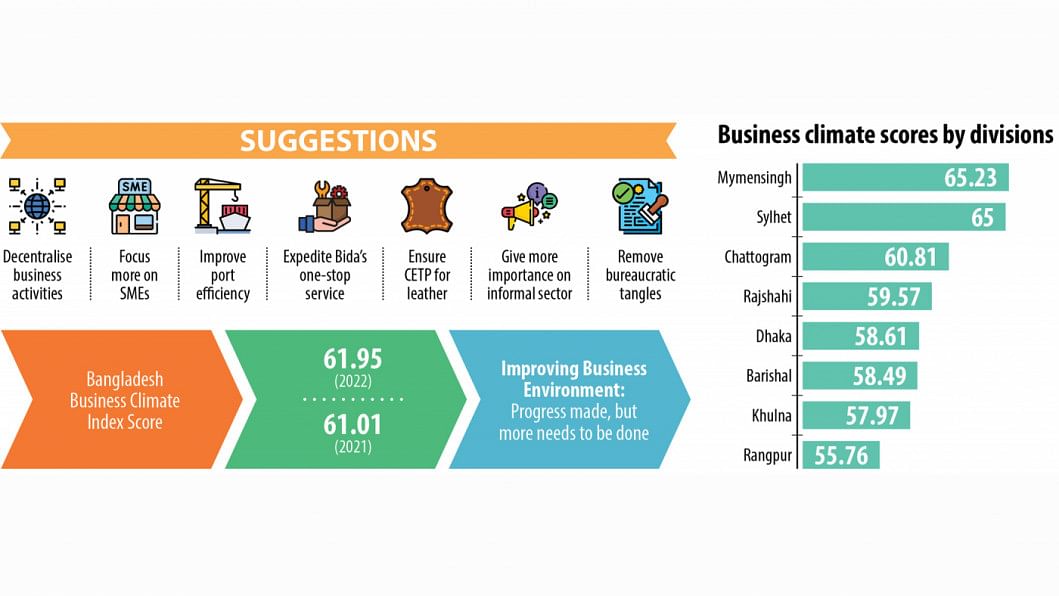Business climate improves slightly

The business climate in the country improved slightly in 2022 compared to 2021 on the back of progress in the areas such as starting a business, infrastructure and labour regulations, according to the Bangladesh Business Climate Index (BBX).
The Metropolitan Chamber of Commerce and Industry (MCCI) in Dhaka, and the Policy Exchange of Bangladesh, a private think-tank, jointly prepared the index, which was first launched in 2021 after the World Bank stopped publishing its Ease of Doing Business Index.
The index uses 10 pillars to assess the overall business environment: starting a business, access to land, availability of regulatory information, infrastructure, labour regulation, dispute resolution, trade facilitation, paying taxes, technologies adoption, and access to finance.
Bangladesh's score in three out of 10 pillars, namely access to land, paying taxes, and access to finance, dipped because of bureaucratic tangles and the dollar crisis following the Russia-Ukraine war.
The overall score did not improve substantially. Last year, the country scored 61.95 out of 100, up from 61.01 in 2021, according to the BBX report.
"This reinforces the fact that no significant reform initiates were undertaken in the past one year resulting in insignificant improvement," it said.
"The distance to 100 suggests that more needs to be done for Bangladesh to become a genuinely attractive emerging market. Most importantly, reforms to improve port congestion, financial intermediation, excessive administrative paperwork, legal framework, tax regulations, and institutional governance will be paramount."
The MCCI and the Policy Exchange published the report at an event at the MCCI office in Dhaka yesterday.
The index was the result of a survey of 518 respondents and the survey was carried out between July and September.
Mymensingh topped the division-wise performance list, with a score of 65.23. Sylhet came second and Chattogram was placed third.
Dhaka and Chattogram scored relatively low although the two divisions are the main economic growth centres of Bangladesh.
"This is because businessmen in the two divisions responded negatively owing to the difficulties they face," said Masrur Reaz, chairman of the Policy Exchange.
Speaking as the chief guest, Commerce Minister Tipu Munshi said the businesses of the country should be broadened and small and medium enterprises should be facilitated further.
"Women entrepreneurs need to be encouraged more."
The BBX attempts to supply local and national government agencies with evidence-based inputs that could help them enhance their service delivery and create actionable policy agendas that are helpful to small local businesses, said MCCI President Md Saiful Islam.
Trade facilitation is a pillar where several bottlenecks still exist, and significant efforts are required for trade facilitation, said the report.
Nihad Kabir, the chairperson of the Business Initiative Leading Development, said Chattogram port ranked 341st out of 370 ports in the World Bank's Container Port Performing Index.
A lack of efficiency and automation at the Chattogram port results in delays. For example, the average ship turnaround time at Chattogram port is 3.23 days whereas it is 0.86 days in Colombo port, she said.
"This is not acceptable. We should improve from this point."
According to the BBX report, an investor typically must navigate 23 government agencies to obtain 150 regulatory services that are required for starting and operating a business.
About 86 per cent of respondents mentioned that they experienced bottlenecks in dealing with government agencies while procuring land in Bangladesh.
It was reflected in the survey, which showed that the score in access to land pillar fell to 53.07 in 2022 from 58.90 in 2021.
More than 95 per cent of the respondents said that they were aware of all the numerous registrations and renewals for setting up and operating their businesses. However, it was difficult for them to find information online.
Bangladesh displayed the best performance in the access to infrastructure pillar, with more than 90 per cent of the respondents saying it was moderately easy to receive utility connections in the categories of water, electricity and sewerage.
Over 90 per cent of the respondents cited that their businesses were affected by the recent power outages. Power outages lasted anywhere between two to nine hours a day.
Six out of 10 respondents said that they found significant bottlenecks in filing and paying both income tax and VAT and 76 per cent said they experienced an adverse impact on their businesses due to the current tax environment.
Bangladesh performed poorly in the access to finance pillar. About 87 per cent of the respondents mentioned that they found significant challenges in accessing bank loans and financing.
Lokman Hossain Miah, executive chairman of the Bangladesh Investment Development Authority, assured the business community that business processes would be elevated to the level of Vietnam in the next three months.
Masud Bin Momen, senior secretary of the foreign affairs ministry, also spoke.

 For all latest news, follow The Daily Star's Google News channel.
For all latest news, follow The Daily Star's Google News channel. 



Comments